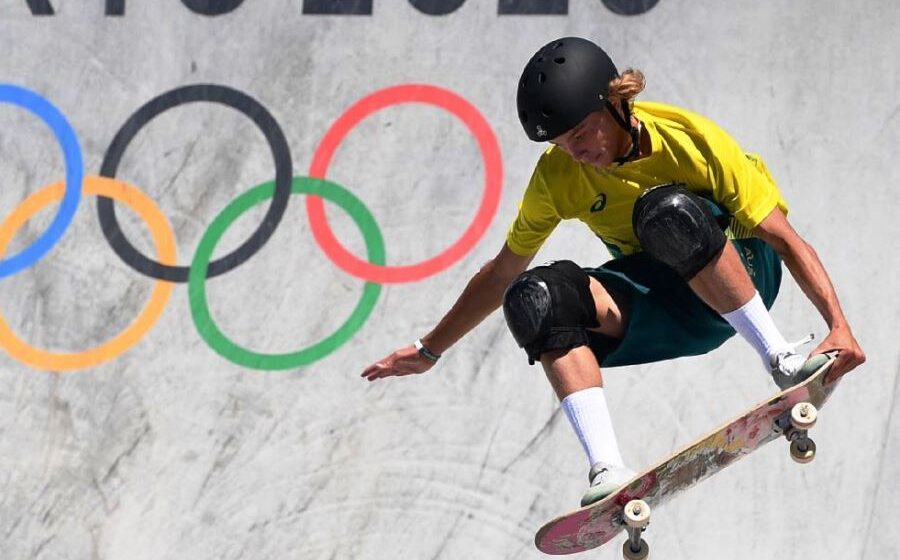As the coronavirus pandemic shut down competitions and clouded the future for the Tokyo Olympics, Australian skateboarder Keegan Palmer and his coach were hatching a cunning plan.
On the other side of the planet, far from the skateboarding community that congregates in California, the 18-year-old set to work perfecting a spinning, twisting, acrobatic trick that is very rarely used in bowl competitions because it is so hard.
So hard that for weeks as he trained, he couldn’t land it.
But soaring off the steep walls of the Tokyo Games’ giant skate bowl, Palmer nailed it.
The reward: a gold Olympic medal around his neck.
“That was all learned in lockdown,” he said. “All those tricks that you saw in my run, I put blood, sweat and tears in Australia.”
His gold in the men’s park event Thursday was the last of four handed out over two weeks in skateboarding’s debut as an Olympic sport. And it was the only gold not won by a skater from Japan, breaking the host nation’s domination in the three previous events at the Ariake Urban Sports Park.
The silver in the men’s park event filled with high-flying tricks went to Pedro Barros of Brazil. It was Brazil’s third medal — all silvers — from skateboarding in Tokyo.
Cory Juneau took bronze, the second skateboarding medal for the United States. The first for the Americans, also a bronze, was won by Jagger Eaton in men’s street.
Palmer, who was born in the U.S. and moved to Australia with his parents as a toddler, was untouchable with two pulsating runs of tricks and stunts in the eight-man final.
He impressed the judges not only with the difficulty of his spinning jumps off the bowl’s walls and ramps but also the way that he strung them together in his seamless 45-second runs.
“We are looking for ways they use the whole park — so every obstacle getting hit, and speed, and then difficulty of tricks,” Canadian judge Mike Prangnell told The Associated Press. “He basically checked off all those boxes.”
Particularly impressive was the trick that proved to be Palmer’s winning secret weapon: the kickflip varial 540.
He worked on it for weeks on a trip to Australia from January to March and uncorked it at the best time — with Olympic gold on the line.
“No one has seen it until this day,” Palmer said, “and that was kind of the game plan.”
His coach, Alex Donnini, added: “No one knew it was coming. We’re really stealthy.”
Soaring skyward off a steep wall, Palmer got the board to spin on its axis as he climbed. Then, at the apex of the ascent, he grabbed the board and twisted it so its nose was pointing downward.
As he begun his downward trajectory, with gravity scheming to make him fail, Palmer glued his feet back on the board and spun as he hurtled toward the hard concrete, making one-and-a-half rotations in all during the entirety of the hair-raising stunt.
He landed the board’s four polyurethane wheels with the softness of a feather.
The judges were wowed. So were his friends — who were also his opponents in Tokyo.
“What he did today is beautiful because he just put skateboarding to a new level,” Barros said.
“He did it effortlessly,” Juneau agreed. “It was great to watch.”
Prangnell, the judge, said: “In a park competition, that’s a very rare trick.”
“He was doing some maneuvers that were incredibly difficult that nobody else could do,” he told the AP. “In skateboarding, we don’t like to say the word ‘training.’ But you know he definitely has been working on it.”
Palmer was the only skater to break the 90-point mark in the competition — and he did so twice in the final.
His 94.04 with his first run put huge pressure on the seven other finalists to go big. Most went too big, with repeated falls, as they tried to catch him.
He then pushed the gold even further out of reach with his third and final run that scored 95.83, and which included the 540 kickflip with added twist.
“I came out swinging,” Palmer said. “I put a lot of hard work into it, so I’m just grateful it paid off.”



